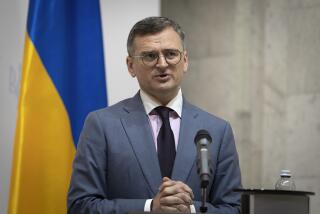Ukraine a Stumbling Block for Reforms, Gorbachev Warns
- Share via
MOSCOW — President Mikhail S. Gorbachev warned Saturday that his reform program will falter across the country if it stumbles in the Ukraine, the Soviet Union’s second-largest republic, which recently has been racked by nationalist, labor and religious unrest.
Vladimir A. Ivashko, the new Communist Party leader of the republic and a strong Gorbachev supporter who was elected three days ago after the ousting of conservative Vladimir V. Shcherbitsky, pledged for his part to improve food supplies, social services and housing.
The interviews with Gorbachev and Ivashko appeared in the official Communist Party daily Pravda. Shcherbitsky also was interviewed and said that it was difficult for him to relinquish his post.
Gorbachev made it clear that he is staking high hopes on the Ukraine, the Soviet breadbasket and an important coal-producing and industrial area.
“If perestroika falters in the Ukraine, it will falter throughout the entire country,” he said.
But he praised Ivashko, saying, “I am sure that a very good base for political leadership has been created in the Ukrainian party.”
Shcherbitsky, 71, a staunch conservative who headed the Ukrainian party organization for 17 years, had come under increasing criticism in recent months and thus had become a growing liability to Gorbachev, who is in the midst of an effort to revive public confidence in the Communist Party.
Legislation is scheduled to be introduced into the current session of the Supreme Soviet, the nation’s Parliament, that would for the first time permit the formation of independent political parties.
Such proposed legislation surely makes the Kremlin uneasy, and Gorbachev clearly is concerned with making sure party leaders have broad public support.
Shcherbitsky’s critics had noted his inability to deal with a miners’ strike this summer in the Donbass region, the country’s largest coal field. Gorbachev himself appeared to support the demands of many of the miners, who simply sought better living conditions.
In addition, Shcherbitsky responded with uncompromising hostility to Ukrainian nationalists, who in recent weeks held a founding meeting and whose leaders had demanded his dismissal.
Finally, he appeared powerless as members of the outlawed Ukrainian Catholic Church grew increasingly agitated. More than 100,000 people demonstrated in the city of Lvov in September to demand religious freedom.
“The people are very dissatisfied,” said Ivashko, 56. “The tempo of renewal in various spheres of life in the republic . . . is clearly insufficient.
“We will devote our attention to resolving the housing and food problems, making more staple goods available, improving health care and resolving ecological issues,” he said.
Ivashko added that he also intends to work to strengthen the role of the party in society so that it does not lose the initiative to informal political groups that have formed in many of the country’s 15 republics.
Shcherbitsky, who was ousted from the Politburo in early September, told Pravda, “I will say very openly it was not very easy to take the decision to retire after so many years of intensive work.”
Gorbachev told Pravda that Shcherbitsky’s many years of party work “deserved a high evaluation.”
He said republican party leaders at Thursday’s meeting praised Shcherbitsky “as a person who worked very hard and was not satisfied with what he achieved.”
Also Saturday, in the neighboring republic of Byelorussia, about 9,000 protesters walked through the capital of Minsk, demonstrating against the slow pace of the cleanup after the 1986 Chernobyl nuclear accident.
The demonstrators, who were defying an official ban against their march, carried signs bearing the names of areas still suffering from high radiation levels.
A total of 31 people are known to have died as a result of the accident, according to official figures.
More to Read
Sign up for Essential California
The most important California stories and recommendations in your inbox every morning.
You may occasionally receive promotional content from the Los Angeles Times.












